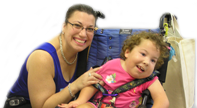Multi-Modal Communication and Learning Strategies for Children with Significant Challenges
| Download |
|
|
Location: Pagoda Hotel, Honolulu, Hawaii
The University of Hawaii will be hosting a training on multi-modal communication and learning strategies for children with significant challenges.
Are you working with children who face severe and multiple challenges such as Cerebral Palsy, Rett Syndrome, cortical visual impairment, deaf-blindness, Autism, intellectual disabilities, and/or Traumatic Brain Injury? Do these children also have complex communication needs? Where do teachers and therapists begin to find the most effective resources and strategies to teach them?
This two day presentation will address questions such as:
- What are we learning from brain research that can help us motivate children and provide opportunities for active learning?
- What types of adaptations and assistive technologies provide these children with a means for more active engagement?
- What strategies help give these children a sense of control and facilitate interaction and communication?
- How can we most effectively utilize newer technologies such as the iPad?
Individuals who attend this workshop will be able to:
✦ Discuss how the brain develops and describe implications for teaching and learning for those students who are developing differently
✦ Describe strategies for increasing motivation, cognitive engagement, and active participation in the learning process.
✦ List characteristics of students who have cortical visual impairment along with other multiple disabilities, and describe useful strategies to help develop vision and communication skills.
✦ Describe strategies that help the child who are on the severe end of the autism spectrum, develop skills in receptive language, expressive language, and cognitive processing skills.
✦ Explain how to utilize what is known about how typical children learn language and apply these principles to creating a multi-modal communication learning environment for children who face complex challenges
✦ Briefly explain how the use of Pragmatic Organization Dynamic Display (PODD) provides an appropriate tool for children at the beginning stages of language development and describe how to implement this in natural contexts.
* This workshop is for anyone working with young children or children functioning at young levels, who have difficulty communicating and interacting with others. This includes children with significant physical and multiple challenges and/or young children on the more severe end of the autism spectrum. Information shared will be useful to parents, teachers, speech therapists, occupational therapists, physical therapists and other supportive personnel.
* Certificate of Completion will be provided upon request
For more details and to register, please see the flyer and registration form attached.







